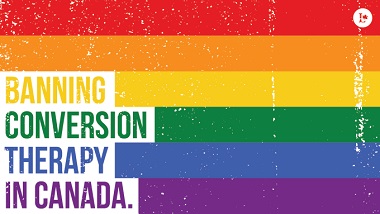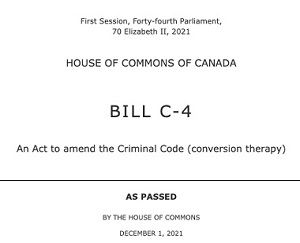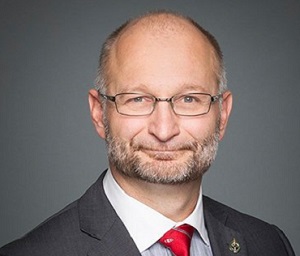
March 9, 2020 tweet on the Liberal Party site: “Conversion therapy is harmful, it’s scientifically discredited, and it’s wrong – period.
Canada’s House of Commons and Senate each agreed earlier this month to pass Bill C-4 without any debate or discussion.
The Bill to ban conversion therapy will come into force January 7, 2022.
Iain Provan has written this response.
Throughout the recent period in which the government of Canada has been seeking to pass legislation pertaining to “conversion therapy” it has consistently claimed that its intent is only to criminalize “coercive and systematic efforts to change” a person’s identity.
In the previous Bill C-6, however, it was already clear that the word “coercion” appeared nowhere within the Bill, while the word “forced” appeared only twice, referring to “conversion therapy” that lacked an adult person’s consent.
Under Bill C-6, the only “conversion therapy” not criminalized was between consenting adults, and only if no advertising and no payment took place.
Bill C-4, which has just passed into law, has now gone further, removing any distinction between minors and adults while sticking resolutely to a definition of “conversion therapy” that continues studiously to avoid the language of coercion.
 “Conversion therapy” in Bill C-4 is simply any “practice, treatment or service designed to
“Conversion therapy” in Bill C-4 is simply any “practice, treatment or service designed to
(a) change a person’s sexual orientation to heterosexual;
(b) change a person’s gender identity to cisgender;
(c) change a person’s gender expression so that it conforms to the sex assigned to the person at birth;
(d) repress or reduce non-heterosexual attraction or sexual behaviour;
(e) repress a person’s non-cisgender gender identity, or
(f) repress or reduce a person’s gender expression that does not conform to the sex assigned to the person at birth.”
All reference to consent has been removed. Bill C-4 sets out to criminalize any such “practice, treatment or service” – whether or not coercion/force is involved. It makes an exception for “practice, treatment or service that relates to the exploration or development of an integrated personal identity” – but only if such “is not based on an assumption that a particular sexual orientation, gender identity or gender expression is to be preferred over another.”
Practices, treatments and services
What are these practices, treatments and services? The government has consistently claimed that this language is entirely clear.
But to the contrary, in Bill C-4 as in the original Bill, it remains entirely undefined and unclear. Not one of these three key terms is defined elsewhere in the Criminal Code of Canada, and “practice” is particularly broad in its normal usage (“a repeated or customary action,” according to Merriam Webster).
The question that naturally arises from such opacity is this: is it possible for any citizen actually to discern in advance of being prosecuted for a particular action what it is that Bill C-4 sets out to criminalize? The answer is “no.”
The legislation’s definition is in fact broad enough to potentially criminalize parents, religious leaders, counsellors, physicians and many other ordinary Canadian citizens simply following their ordinary “practices.”
This became particularly clear during the Justice Committee hearings on Bill C-6, when one member placed before a Department of Justice official a hypothetical case in which a mother concerned for the well-being of her son refuses to allow him to go to school dressed up as a girl.
The MP asked whether this counts as “conversion therapy” under the terms of the legislation. The official responded by saying that it does not constitute a “practice, treatment or service” – it is not a “formalized intervention.”
However, when the MP objected that surely the mother is engaging in a “practice,” the official acknowledged that “practice” is indeed a broader term than the other two in the Bill’s definition, and (at least for a moment) she appeared herself to define “practice” as that which is “habitual and regular” rather than “formalized.”
So it is not at all clear what the legal position of this mother would be if she persisted in her “practice” – not least because, in the new language of Bill C-4, she is certainly providing evidence in doing so of a belief that “a particular sexual orientation, gender identity or gender expression is to be preferred over another.”
Denial of choice

The Liberals’ Minister of Justice David Lametti has pushed Bill C-4 through.
The government may well wish to claim that this new legislation is designed to criminalize only coercive practices. However, the Bill itself makes no pretense of limiting itself to this goal, and it does not mainly concern this issue.
With this legislation now in play, many minors (first) will be deprived of the kind of counselling that they need in the midst of confusion and distress about their identity.
Those suffering from gender dysphoria, for example, may have no trouble in finding counselling that affirms their desire to gender-transition, but they will be greatly challenged (along with their parents) in finding counselling that affirms them in their given body.
This is because any “practice, treatment or service” that can be characterized as “designed to change” an individual identity already present “within” a minor (of whatever age) can now be brought under the prosecutorial gaze, as can anything which would even merely “reduce a person’s gender expression that does not confirm to the sex assigned to the person at birth.”
And the legal sanction envisaged for a professional offering any such “practice, treatment or service” to minors is more than severe enough (“up to five years in prison”) to cause many of them to walk away from this now dangerous and unpredictable business before trouble ensues.
Professional regulators can also be expected to take their cue from Bill C-4 in advising or threatening their members to steer far clear as well.
Constrains consenting adults
What is new about Bill C-4 in relation to Bill C-6, however, is that even consenting adults will find it difficult to find such counselling.
Because some adults had testified to the Justice Committee during the Bill C-6 hearings that they had found “conversion therapy” helpful, Liberal Justice Committee members resisted NDP and other calls to prevent even adults from accessing it at all.
Indeed, Justice Minister David Lametti is on record as having stated during the Justice Committee process that he did not believe that a law banning adults from freely consenting to “conversion therapy” would withstand a constitutional challenge.
Remarkably, then, in Bill C-4 any idea of legitimate consent has been removed. It seems that even the Conservative Party no longer believes in freedom of adult choice when it comes to how we handle our sexual or gendered lives.
All “conversion therapy” is now simply criminal. In fact, anyone who “knowingly promotes or advertises conversion therapy” has committed a crime as well. This is explicitly designed to catch word-of-mouth recommendations as well as formal advertising.
So there might be practices, treatments and services in respect of matters of sex and identity – counselling that helps “reduce non-heterosexual . . . sexual behaviour,” for example – of which consenting adult Canadians might well wish to avail themselves.
But the government of Canada has decreed that, whether they wish it or not, anyone offering them such help, or “promoting” that help, is a criminal. And this is so even though many people have testified that such “practices” have previously saved their lives. Even fully informed consent is not enough.
Deliberate intent
Do our politicians have any excuse for allowing this dangerous, illiberal Bill to pass into law? Were they unaware, perhaps, of its deficiencies – of the way in which it evidently does not serve the common good? Did they perhaps not have any chance to correct the problems?
Unfortunately, this is not the case. The Justice Committee received massive public and professional input during its hearings that drew attention to the deeply problematic nature of the Bill’s definition.
The Conservative Party’s 2021 election platform statement on “conversion therapy” thereafter explicitly drew attention to the problem, promising to fix the definition.
None of the testimony mattered in the end; nor did the CPC election promise. Bill C-4 passed both the House and the Senate with unanimous consent in the course of just over one week in late fall, without any possibility being provided for proper scrutiny of it.
Politicians of all parties were more than happy to display an astonishing and shameful disrespect for the democratic process in getting this business done. Clearly, no one wanted further questions asked about either the constitutionality or the justice of this Bill. Everyone chose to shut those important questions down.

Iain Provan
Conclusion
Bill C-4 is not only legislation that will criminalize certain coercive practices. It is also legislation that will curtail all sorts of important rights and freedoms, significantly changing Canadian society for the worse. We should all be very concerned about this.
Born and educated in the United Kingdom, Dr. Iain Provan holds a PhD from Cambridge, and is now Marshall Sheppard Professor of Biblical Studies at Regent College.
He has written numerous books, including Seriously Dangerous Religion (2014), The Reformation and the Right Reading of Scripture (2017), and Seeking What is Right: The Old Testament and the Good Life (2020).
*******************************
Here are several links that might be relevant as the implications of Bill C-4 become clearer when it comes into effect early next year:
- The Evangelical Fellowship of Canada has followed the issue closely.
- ARPA Canada is concerned about the Bill.
- The Canadian Conference of Catholic Bishops critiqued the earlier version of the Bill.
- Free to Care is “part of a movement to protect the rights of all Canadians to care for others.”
- BeyondGay.ca: “Because your sexual orientation may not be a choice but your behaviour is.”

The unanimous vote in Parliament makes it clear that social conservatives, Christian or not, have no voice and no political representation in this country. Red Tories have rejected social conservatism, and the other parties reject it out of hand.
Are we praying hard enough for our country? We need to prayer harder, and we need to be salt and light – desperately.
Thank you, Dr. Provan, for this insightful and much needed response to the recent passing of Bill C-4!
‘Truth-Liberty-Humanity’: may Canadians gain a renewed courage to stand for truth, without which there can be no genuine liberty, without which there can be no human flourishing.
Sincerely,
Monika Hilder